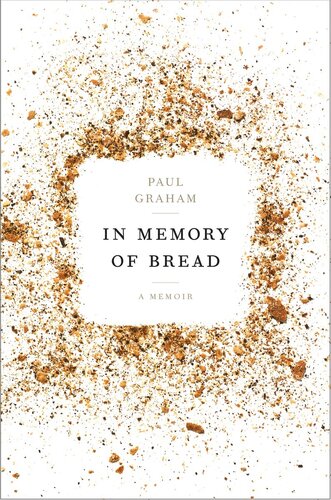
In Memory of Bread
A Memoir
کتاب های مرتبط
- اطلاعات
- نقد و بررسی
- دیدگاه کاربران
نقد و بررسی

May 16, 2016
Food writer, professor, and locavore Graham knows firsthand about the old adage that you don't know what you've got until it's gone. When Graham was in his late 30s, knee-deep in love with food and managing a serious beer-brewing practice with his pals in rural New York on the Canadian border, he suddenly discovered that he had celiac disease and had to give up what was almost a sacrament for him: gluten. In detailed and thoughtful prose, balancing the lyrical with the scientific, Graham illustrates how his deep connection to bread was challenged, and how his body was gravely poisoned by his glutinous true love. His wife, Bec, who baked regularly and filled their house with the deeply familiar aroma of bread, committed the ultimate act of love and gave up gluten as well, even though she is not allergic to it. Graham becomes a "scholar of stews and ragouts," and says, "By necessity, I became more fearless and innovative" as a cook. The rise and fall and rise again of Graham's relationship with bread is enriched by his renewed passion for cooking. The landscape of gluten-free offerings is getting better, but Graham discovered during his transition that many manufacturers who remove gluten from common items also radically raise the fat or sugar. Graham skillfully blends each part of his memoir with the precision of a baker: it's part history and part science, with a dash of humor and a generous helping of exquisite storytelling.

April 15, 2016
Faced at age 36 with the sudden onset of celiac disease, a professor realizes that his days of brewing beer and eating his wife's homemade bread are over.In his first book, Graham (English/St. Lawrence Univ.) takes a mostly humorous approach to his adventures in adjusting to life without wheat, oats, and barley. At first, he and his wife, who gave up all gluten in solidarity with him, sampled some beers that tasted "of vegetal funk, like old lettuce" and baked some truly inedible loaves that "fell apart in chunks, like pieces of a dried-out plaster wall." Eventually, with the help of the ever scientific America's Test Kitchen, Graham found a few recipes for what almost tasted like bread. Brewing beer proved to be far more difficult, but he has made do with brews like Omission Pale Ale and Glutenberg. The book detours briefly into Graham's health crisis, the history of wheat, and the mystery surrounding what appears to be a rapid increase in the number of cases of celiac disease. For the most part, however, the author stays focused on his experience, whether he's mourning the loss of the luxury of turning a chef loose to make a meal for him, bemoaning the tastelessness of most of the gluten-free offerings at the supermarket, indulging in "gluten-voyeurism" by watching the Food Channel's Guy Fieri pig out on diner fare, or realizing how much he hates millet ("dry, gritty, and less flavorful than any other grain I had ever tasted"). Graham's awareness that, since his health improved radically once he changed his diet, he was left suffering what should probably be considered a "first-world problem" goes a long way toward increasing reader sympathy, and his mouthwatering evocations of homemade tortillas and buckwheat crepes make it clear that he still finds plenty to enjoy in and out of the kitchen. An enjoyable memoir for wheat-free foodies and others limited in their gastronomical choices.
COPYRIGHT(2016) Kirkus Reviews, ALL RIGHTS RESERVED.

























دیدگاه کاربران